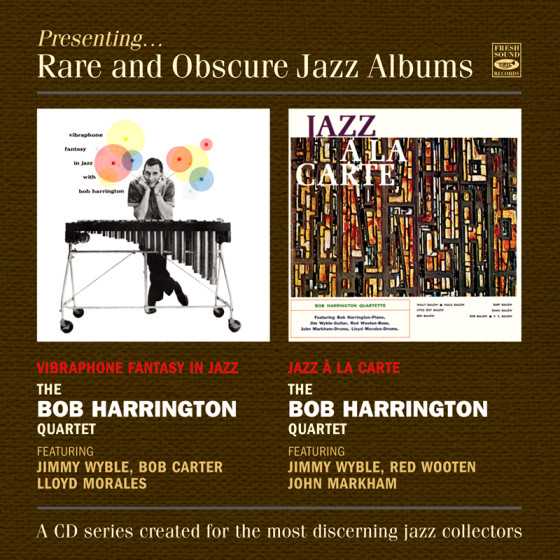No products
Marty Bell & Don Heller
The Voice of Marty Bell + Blame It on My Youth (2 LP on 1 CD)
Best Voices Time Forgot
Personnel:
Marty Bell, Don Heller (vcl), Don Elliott (vib, tp, perc, arr), Ralph Burns (p, arr, cond), Al Epstein (sax), Bob Corwin (p), Billy Bauer, Allen Hanlon, Freddie Green (g), Vinnie Burke, Charles Mingus, George Duvivier (b), Jim Campbell, Don Lamond, Osie johnson (d)
Reference: FSR V203 CD
Bar code: 8427328642033
The Best Voices Time Forgot
Collectible Albums by Top Male Vocalists
· Collector's Edition
· 2 Original LPs on 1 CD
· Original Cover Art, Liner Notes
· Complete Personnel Details
· Newly Remastered in 24-Bit
The Voice of Marty Bell
Marty Bell was born in 1925 in Newark, New Jersey. He started playing trumpet when he was about 15, and began singing just a few years later, while he was part of an Army band. From 1946, and for several years thereafter, he toured as a big band singer, but never neglected his trumpet work entirely. With that experience under his belt, he made the break away from band vocalizing and started working as a single. Marty stood out for his light but sturdy, swinging sound, and his easy, consistent command of the beat. This album was released in 1956 and marked his debut on record. Working with him on eight of the tracks —and taking off on their own on four others— we find the swinging quartet led by the multi-talented jazzman Don Elliott.
Blame It on My Youth
'Blame It on My Youth' introduced Don Heller —a 22 year-old Brooklyn singer— to the world. Down Beat magazine praised the album as one of the most encouraging releases in 1956, but unfortunately this did not translate into success, and his name was soon forgotten. Somewhat Sinatra-influenced, Heller sings with fullness of sound, ungimmicked directness, and musical taste, happily failing entirely to conceal the exuberance that is basic in his singing. Ralph Burns was responsible for a set of smooth, imaginative arrangements. Among the alternating musicians we can hear in these recordings there are some top jazzmen, including Burns himself on piano; Charlie Mingus, Wendell Marshall, Freddie Greene, Don Lamond, Billy Bauer, and Osie Johnson. The tunes are all standards, treated well by Heller himself.
Tracklist
01. I Didn't Know What Time It Was (Rodgers-Hart) 2:3402. I Thought About You (Van Heusen-Mercer) 3:02
03. Moonlight in Vermont (Blackburn-Suessdorf) 3:50
04. The Girl Next Door (Martin-Blane) 3:15
05. According to Moyle (Don Elliott) 3:26
06. S'posin' (Denniker-Razaf) 2:56
07. This Can't Be Love (Rodgers-Hart) 2:02
08. The Love of My Live (Shaw-Mercer) 3:00
09. I Found a New Baby (Williams-Palmer) 4:57
10. You Go to My Head (Gillespie-Coots) 3:25
11. September Song (Weill-Anderson) 3:10
12. Me and You (Duke Ellington) 2:10
13. Blame It on My Youth (Heyman-Levant) 3:02
14. This Heart of Mine (Warren-Freed) 2:23
15. Ev'ry Time (Martin-Blane) 3:08
16. Bidin' My Time (G. & I.Gershwin) 2:59
17. You Make Me Feel So Young (Myrow-Gordon) 2:10
18. Ridin' on the Moon (Arlen-Mercer) 1:50
19. I've Got a Pockeful of Dreams (Monaco-Burke) 2:31
20. A Nightingale Sang in Berkeley Square (Maschwitz-Sherwin) 3:57
21. The Folks Who Live on the Hill (Kern-Hammerstein II) 2:44
22. Time Was (Prado-Luna-Russell) 2:40
23. Please Be Kind (Chaplin-Cahn) 3:15
24. In Other Words (Bart Howard) 2:50
Album details
Sources:Tracks #1-12, from “Marty Bell -The Voice of Marty Bell”
(Riverside RLP 12-206)
Tracks #13-24, from “Don Heller -Blame It on My Youth”
(Epic LN 3220)
Personnel on "The Voice of Marty Bell":
Marty Bell, vocals (except on #3,5,9,11), with the Don Elliott Quartet
Don Elliott, vibes, trumpet (#10), and bongos (#7); Bob Corwin, piano; Vinnie Burke, bass; Jim Campbell, drums.
Recorded in New York City, January 17 & 23, 1956
Personnel on "Blame It on My Youth":
Don Heller, vocals, accompanied by Orchestra Arranged & Conducted by Ralph Burns
Tracks #13,14,18,21: Al Epstein, sax; Ralph Burns, piano; Nettie Druzinsky, harp; Billy Bauer, Allen Hanlon, guitars; Charles Mingus, bass; Don Lamond, drums.
Tracks #15,16,19,23: Bernie Leighton, celeste; Janet Putnam, harp; Art Ryerson, guitar; George Duvivier, bass; Osie Johnson, drums.
Tracks #17,20,22,24: Janet Putnam, harp; Billy Bauer, Freddie Green, guitars; Wendell Marshall, bass; Don Lamond, drums.
Recorded in New York City, 1956
Original recordings produced by Bill Grauer & Orrin Keepnews (Riverside), and Marvin Holtzman (Epic)
Liner notes by Jordi Pujol & Orrin Keepnews
This CD compilation produced by Jordi Pujol
Hi-Fi / Mono • 24-Bit Digitally Remastered
Blue Moon Producciones Discograficas S.L.




























